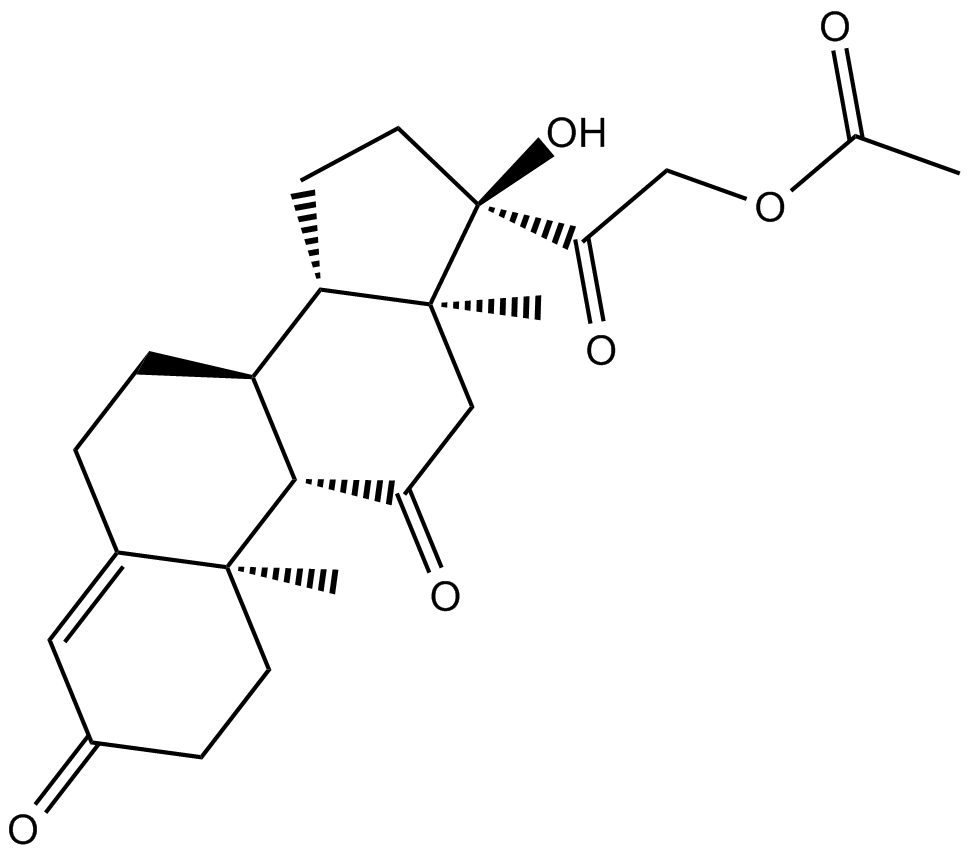Cortisone acetate (Synonyms: Cortisone 21-acetate, NSC 49420) |
| Catalog No.GC16772 |
Glucocorticoid receptor agonist
Products are for research use only. Not for human use. We do not sell to patients.

Cas No.: 1950/4/4
Sample solution is provided at 25 µL, 10mM.
Cortisone acetate (17-hydroxy-11-dehydrocorticosterone), a 21-carbon steroid hormone, is one of the main hormones released by the adrenal gland in response to stress.IC50 Value: Target: Glucocorticoid Receptorin vitro: Cortisone suppressed this apoptosis at a concentration range of 1-10,000 ng/ml (2.8-28,000 nM) dose-dependently. Suppression of cortisol-induced apoptosis by cortisonewas consistently observed in PBMCs derived from 16 healthy subjects. Examination for inhibitory activities of the steroids against [3H]dexamethasone binding to PBMCs suggested that cortisone can bind cellular GC-receptors (GC-Rs), but the affinity of cortisone to GCRs is 1/30 or less than that of cortisol [1]. Apoptosis was also readily induced in primary cultures of third trimester decidual cells when treated with cortisol, cortisone, or dexamethasone (all 100 nM for 24 h) [2]. in vivo: The effects of a single dose of cortisone acetate (5 or 10 mg/100 g body weight) on B cells were examined in young chickens. A dose-dependent increase in numbers of circulating B lymphocytes and a change in their Ig-class distribution were followed by parallel increase in splenic plasma cells and serum immunoglobulins. The higher dose of cortisone produced changes in Bmu and Bgamma cells, whereas the lower dose primarily affected Bmu cells [3]. Adult female CD-1 mice received daily injections of cortisone acetate (0--50 mg/kg subcutaneously) and/or amphotericin B (0--12.5 mg/kg intraperitoneally) in a checkerboard combination dosage pattern for 30 days. Dosages of amphotericin B and cortisone acetate that produced little or no mortality individually produced significant (P less than 0.005) mortality in combination [4].Toxicity: Oral use of cortisone has a number of potential systemic side-effects: hyperglycemia, insulin resistance, diabetes mellitus, osteoporosis, anxiety, depression, amenorrhoea, cataracts and glaucoma, among other problems.
References:
[1]. Hirano T, et al. Cortisone counteracts apoptosis-inducing effect of cortisol in human peripheral-blood mononuclear cells. Int Immunopharmacol. 2001 Nov;1(12):2109-15.
[2]. Chan J, et al. Glucocorticoid-induced apoptosis in human decidua: a novel role for 11beta-hydroxysteroid dehydrogenase in late gestation. J Endocrinol. 2007 Oct;195(1):7-15.
[3]. Rusu VM, et al. In vivo effects of cortisone on the B cell line in chickens. J Immunol. 1975 Nov;115(5):1370-4.
[4]. Kisch AL, et al. Synergistic nephrotoxicity of amphotericin B and cortisone acetate in mice. J Infect Dis. 1978 Jun;137(6):789-94.
Average Rating: 5 (Based on Reviews and 35 reference(s) in Google Scholar.)
GLPBIO products are for RESEARCH USE ONLY. Please make sure your review or question is research based.
Required fields are marked with *




















